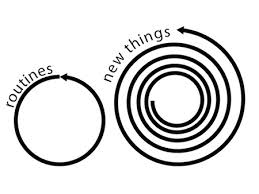Humans are habit driven. Even the most free spirited soul has their routines, though they may not seem so routine to others. In some ways, our habits are what truly define us. Ultimately, this means to obtain holistic health, we must create healthy habits for ourselves. This is not always as easy as it sounds. And there are a few traps along the way.
Habits are created by repetition. Many say that it takes 21 days to form a habit. Personally, I think the time frame will be different based on the specifics, but I agree that routine is required to create habits. Forming habits is actually pretty easy. Many of our habitual behaviors were actually created for us, or became habits without us even noticing. The challenge is rather separating productive habits from destructive ones. And then replacing the “bad” with the “good”.
The key to this is self-awareness. We need to be able to sit back from ourselves, and watch. If we can’t do this, then we need others to help us. Once we identify the habits we do not want, we then can start replacing them with those we DO want. Repetition, repetition, repetition. Keep doing it until we no longer have to think about doing it. Once it becomes innate, then we begin changing for the better.
But just as with everything, there is such a thing as too much routine. If we repeatedly do something over and over again, without changing, then we might end up losing some habits we do not wish to lose, or losing our flexibility. We might neglect other aspects of ourselves, creating an unhealthy balance. If we do the same physical exercises over and over again, what muscles are being neglected? What parts are receiving undue wear, setting them up for future injury?

My answer to this is to intentionally break routines on a regular basis. Make breaking the routine part of the routine. Not only does this step us out of the possibility of creating a rut for ourselves, it keeps us sharp and ready. For instance, while we might want to create the habit of exercising certain body parts according to a specific schedule, we probably also want to mix up what exercises we use.
This applies to our emotional and spiritual health as well. We have just as many habits of behavior as we do of physical activity, but often we are less aware of them, for they may be more subtle. Routines of the mind create closed minds. Closed minds are no more healthy than lethargic bodies.
I am ambidextrous. Not because of any innate talent (though that may play a role), but because, despite constant training otherwise, I frequently choose to use my other hand to do things, doing it enough times so that I am pretty comfortable doing anything with either hand. Routines have value … if used wisely. But don’t get stuck in them. That way lies stagnation.
